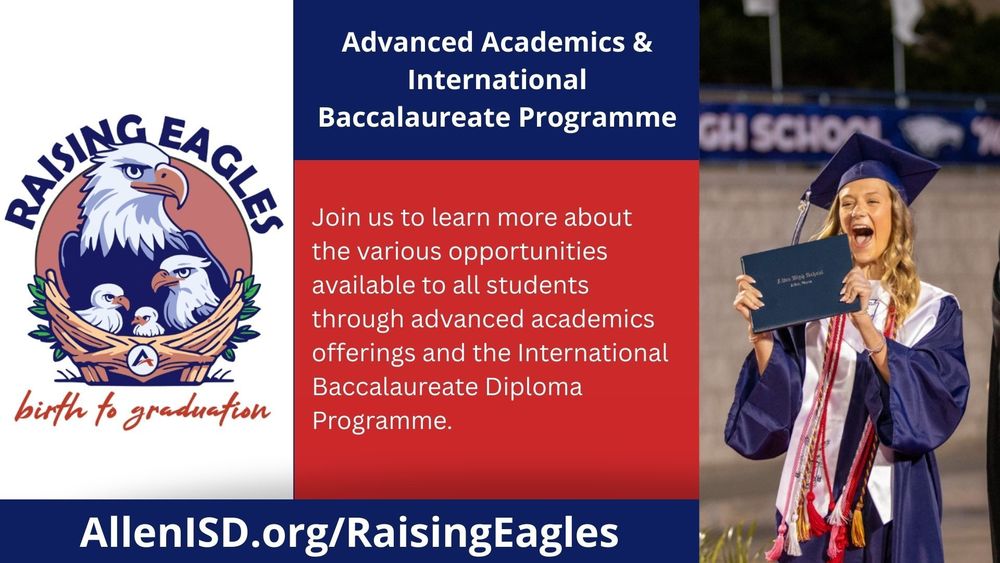Introduction
At Allen ISD, students have access to a wide range of advanced academic opportunities designed to prepare them for college and career success. These opportunities begin as early as middle school and expand throughout high school, offering pathways such as Advanced Placement (AP), International Baccalaureate (IB), advanced coursework, and dual credit.
Understanding these programs helps families make informed decisions about which courses best match their student’s goals, passions, and future plans. This guide summarizes the advanced academic options at Allen ISD, including key terms, pathways, planning strategies, and frequently asked questions.
Key Terms to Understand
Open Enrollment
Open enrollment means no prior grade or teacher recommendation is required to take a course. For example, students can choose to take AP Human Geography in ninth grade without any prerequisites.
Prerequisite
A prerequisite means a student must complete a specific course before advancing. For example, Algebra II requires Algebra I.
Academic Planning Guide (APG)
The APG is an essential resource for parents and students. It outlines available courses, prerequisites, GPA weights, and pathways. Families will use it frequently throughout middle and high school when making graduation and course planning decisions.
GPA Weighting
Allen ISD uses a weighted GPA system to recognize the rigor of advanced coursework:
Level 1 (On-Level Courses): 4.0 scale
Level 2 (Advanced/Dual Credit Courses): 4.5 scale
Level 3 (AP and IB Courses): 5.0 scale
This ensures that students engaging in more rigorous coursework receive recognition for their effort. Colleges and universities often evaluate GPA alongside course rigor during admissions.
Advanced Academic Options
Advanced Courses
Formerly known as Pre-AP, advanced courses build a foundation for AP or IB participation.
Middle School Opportunities:
Advanced math begins in sixth grade with district evaluation.
Beginning in seventh grade, students can choose advanced English, science, and social studies.
Eighth graders may take Algebra I and advanced language courses (earning high school credit, though not weighted).
Purpose: Introduce students to rigorous coursework while allowing them to explore subjects they are passionate about.
Advanced Placement (AP)
AP courses are college-level classes taught in high school. Students take an AP exam at the end of the course; depending on their score and the university they attend, they may receive college credit.
First AP Opportunity: AP Human Geography in ninth grade (open enrollment).
Total Offerings: Around 28 AP courses available across disciplines.
Benefits: Flexibility in course selection, broad subject areas, potential for college credit.
International Baccalaureate (IB) Diploma Program
Allen High School has offered the IB Diploma Program since 1999.
Timeline: Begins in 11th grade and continues through 12th.
Course Requirements: Students take courses in seven subject areas, including English, math, science, and electives.
Core Components:
Extended Essay (EE): Research project
Theory of Knowledge (TOK): Course exploring the nature of knowledge
Creativity, Activity, Service (CAS): Holistic requirement emphasizing personal growth and community engagement
GPA Weight: All IB courses are weighted at 5.0.
Flexibility: Students may pursue the full IB diploma or take select IB courses (open enrollment in certain cases) for certificates.
Dual Credit
Dual credit allows students to take courses that count toward both high school and college. While details were presented in another Raising Eagles session, it’s important to know that dual credit is another pathway for earning advanced standing before graduation.
Planning for Advanced Academics
Begin with the End in Mind
Students should consider their long-term goals when choosing courses. For example:
If aiming for IB Higher Level Math, a student should plan to be in Pre-Calculus by 10th grade.
College admissions requirements should guide planning, as universities differ in how they accept AP, IB, or dual credit.
Timeline Considerations
Course selection occurs at the end of each semester.
Students meet with counselors early in the spring to finalize selections.
Specific meetings are held for IB and dual credit pathways.
Balance and Well-Being
While rigor is important, students should avoid overloading themselves. Counselors encourage families to balance academics with extracurriculars, community involvement, and personal well-being.
Key Considerations for Course Selection
Earning Credit vs. Learning
While exams and credit-by-exam (CBE) options exist, the district emphasizes sitting through courses for deeper learning, skill development, and preparation for future success.Speed vs. Quality
Students may try to rush through material, but lasting success comes from embracing challenges and developing study skills, time management, and perseverance.Support Systems
Teachers, coordinators, tutorials, and parent involvement are all critical supports for students in advanced coursework.
Frequently Asked Questions
What’s the difference between AP, IB, and dual credit?
Each pathway offers rigorous coursework but differs in structure, credit transfer, and long-term benefits. Families should review comparison charts and consider future college plans.Should students use Credit by Exam (CBE) to accelerate?
In most cases, no. CBEs can be useful for language if a student is fluent, but for core academic courses, sitting through the course provides a stronger foundation.What if my 8th grader doesn’t take Algebra I?
That’s fine. Students can accelerate later by doubling up on Algebra II and Geometry in 10th grade.What are the prerequisites for IB?
• Completion of Algebra II by 10th grade
• Two years of the same foreign language by 10th grade (three years recommended)Can students mix AP, IB, and dual credit?
Yes. Many students combine pathways to create a personalized academic experience.How successful are Allen ISD students in AP exams?
In the most recent cycle, 90% of Allen ISD students scored a 3 or above, compared to the national average of around 60%.Do advanced courses help with PSAT/SAT prep?
Yes. In addition, Allen offers SAT/ACT prep courses and PSAT boot camps.
Tips for Families
Use the Academic Planning Guide as a reference throughout middle and high school.
Encourage your student to take advanced courses in subjects they enjoy and want to explore further.
Maintain balance between rigorous academics and extracurricular activities.
Plan early for prerequisites, especially for IB.
Stay in communication with counselors and advanced academic coordinators for personalized guidance.
Conclusion
Allen ISD provides a wealth of advanced academic opportunities that allow students to challenge themselves, earn college credit, and prepare for future success. With careful planning, balance, and support, families can guide their students toward the pathway that best matches their interests, strengths, and long-term goals.

